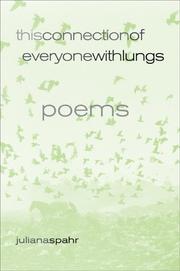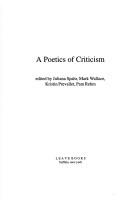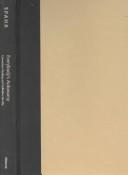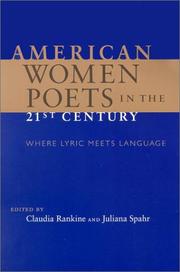| Listing 1 - 9 of 9 |
Sort by
|
Book
ISBN: 1282357948 9786612357947 0520938275 9780520938274 9781282357945 Year: 2005 Publisher: Berkeley, CA : University of California Press,
Abstract | Keywords | Export | Availability | Bookmark
 Loading...
Loading...Choose an application
- Reference Manager
- EndNote
- RefWorks (Direct export to RefWorks)
Part planetary love poem, part 24/7 news flash, the hypnotic poems of This Connection of Everyone with Lungs wrap with equal, angular grace around lovers and battleships. These poems hear the tracer fire in a bird's song and capture cell division and troop deployments in the same expansive thought. They move through concentric levels of association and embrace -from the space between the hands to the mesosphere and back again-touching everything in between. The book's focus shifts between local and global, public and private, individual and social. Everything gets in: through all five senses, through windows, between your sheets, under your skin.
Protest poetry, American. --- September 11 Terrorist Attacks, 2001 -- Poetry. --- Terrorism -- Poetry. --- Victims of terrorism -- Poetry. --- September 11 Terrorist Attacks, 2001 --- Victims of terrorism --- Protest poetry, American --- Terrorism --- American Literature --- English --- Languages & Literatures --- Acts of terrorism --- Attacks, Terrorist --- Global terrorism --- International terrorism --- Political terrorism --- Terror attacks --- Terrorist acts --- Terrorist attacks --- World terrorism --- Direct action --- Insurgency --- Political crimes and offenses --- Subversive activities --- Political violence --- Terror --- American protest poetry --- American poetry --- Terrorism victims --- Victims of crimes --- 9/11 Terrorist Attacks, 2001 --- 911 Terrorist Attacks, 2001 --- Attack on America, 2001 (September 11 Terrorist Attacks) --- Nine-Eleven Terrorist Attacks, 2001 --- Pentagon-World Trade Center Terrorist Attacks, 2001 --- Sept. 11 Terrorist Attacks, 2001 --- September 11 Terror Attacks, 2001 --- September 11 Terrorism, 2001 --- Terrorist Attacks, September 11, 2001 --- World Trade Center-Pentagon Terrorist Attacks, 2001 --- Hijacking of aircraft --- all encompassing. --- american poets. --- contemporary poetry. --- contemporary. --- current events. --- english majors. --- female authors. --- global issues. --- globalism. --- levels of association. --- lit students. --- literary criticism. --- literary studies. --- local issues. --- love poems. --- lovers. --- mesosphere. --- military actions. --- modern poets. --- nature and humanity. --- news and poetry. --- personal perspective. --- poems. --- poetry collection. --- private lives. --- public sphere. --- sensory experiences. --- social impact.
Book
ISBN: 9781574232172 1574232177 Year: 2011 Publisher: Boston : David R. Godine,
Abstract | Keywords | Export | Availability | Bookmark
 Loading...
Loading...Choose an application
- Reference Manager
- EndNote
- RefWorks (Direct export to RefWorks)

ISBN: 0520242904 9780520242906 0520242955 9780520242951 Year: 2005 Publisher: Berkeley : University of California Press,
Abstract | Keywords | Export | Availability | Bookmark
 Loading...
Loading...Choose an application
- Reference Manager
- EndNote
- RefWorks (Direct export to RefWorks)
September 11 Terrorist Attacks, 2001 --- Victims of terrorism --- Protest poetry, American. --- Terrorism --- Terrorism. --- Victims of terrorism. --- September 11 Terrorist Attacks (2001). --- 2001.

ISBN: 0922668116 9780922668113 Year: 1994 Publisher: Buffalo, N.Y. : Leave Books,
Abstract | Keywords | Export | Availability | Bookmark
 Loading...
Loading...Choose an application
- Reference Manager
- EndNote
- RefWorks (Direct export to RefWorks)
Criticism. --- Literature --- Style, Literary. --- History and criticism --- Theory, etc.
Book
ISBN: 9780674986961 Year: 2018 Publisher: Cambridge Harvard University Press
Abstract | Keywords | Export | Availability | Bookmark
 Loading...
Loading...Choose an application
- Reference Manager
- EndNote
- RefWorks (Direct export to RefWorks)
In 1956 W. E. B. Du Bois was denied a passport to attend the Présence Africaine Congress of Black Writers and Artists in Paris. So he sent the assembled a telegram. "Any Negro-American who travels abroad today must either not discuss race conditions in the United States or say the sort of thing which our State Department wishes the world to believe." Taking seriously Du Bois's allegation, Juliana Spahr breathes new life into age-old questions as she explores how state interests have shaped U.S. literature. What is the relationship between literature and politics? Can writing be revolutionary? Can art be autonomous, or is escape from nations and nationalisms impossible? Du Bois's Telegram brings together a wide range of institutional forces implicated in literary production, paying special attention to three eras of writing that sought to defy political orthodoxies by contesting linguistic conventions: avant-garde modernism of the early twentieth century; social-movement writing of the 1960s and 1970s; and, in the twenty-first century, the profusion of English-language works incorporating languages other than English. Spahr shows how these literatures attempted to assert their autonomy, only to be shut down by FBI harassment or coopted by CIA and State Department propagandists. Liberal state allies such as the Ford and Rockefeller foundations made writers complicit by funding multiculturalist works that celebrated diversity and assimilation while starving radical anti-imperial, anti-racist, anti-capitalist efforts. Spahr does not deny the exhilarations of politically engaged art. But her study affirms a sobering reality: aesthetic resistance is easily domesticated.--
American literature --- Politics and literature --- Nationalism and literature --- Political aspects
Book
ISBN: 0674988817 0674988833 9780674988835 9780674986961 0674986962 Year: 2018 Publisher: Cambridge, Massachusetts London, England
Abstract | Keywords | Export | Availability | Bookmark
 Loading...
Loading...Choose an application
- Reference Manager
- EndNote
- RefWorks (Direct export to RefWorks)
In 1956 W. E. B. Du Bois was denied a passport to attend the Présence Africaine Congress of Black Writers and Artists in Paris. So he sent the assembled a telegram. "Any Negro-American who travels abroad today must either not discuss race conditions in the United States or say the sort of thing which our State Department wishes the world to believe." Taking seriously Du Bois's allegation, Juliana Spahr breathes new life into age-old questions as she explores how state interests have shaped U.S. literature. What is the relationship between literature and politics? Can writing be revolutionary? Can art be autonomous, or is escape from nations and nationalisms impossible? Du Bois's Telegram brings together a wide range of institutional forces implicated in literary production, paying special attention to three eras of writing that sought to defy political orthodoxies by contesting linguistic conventions: avant-garde modernism of the early twentieth century; social-movement writing of the 1960s and 1970s; and, in the twenty-first century, the profusion of English-language works incorporating languages other than English. Spahr shows how these literatures attempted to assert their autonomy, only to be shut down by FBI harassment or coopted by CIA and State Department propagandists. Liberal state allies such as the Ford and Rockefeller foundations made writers complicit by funding multiculturalist works that celebrated diversity and assimilation while starving radical anti-imperial, anti-racist, anti-capitalist efforts. Spahr does not deny the exhilarations of politically engaged art. But her study affirms a sobering reality: aesthetic resistance is easily domesticated.--
American literature --- Politics and literature --- Nationalism and literature --- Political aspects. --- 1950s America. --- American Committee for Cultural Freedom. --- Congress for Cultural Freedom. --- Multicultural literature. --- Poetry Foundation. --- U.S. Department of State. --- Political aspects

ISBN: 0817310541 0817310533 Year: 2001 Publisher: Tuscaloosa, AL : University of Alabama Press,
Abstract | Keywords | Export | Availability | Bookmark
 Loading...
Loading...Choose an application
- Reference Manager
- EndNote
- RefWorks (Direct export to RefWorks)
AMERICAN POETRY --- ANDREWS (BRUCE), 1948 --- -MULLEN (HARRYETTE ROMELL) --- GROUP IDENTITY IN LITERATURE --- READER-RESPONSE CRITICISM --- STEIN (GERTRUDE), 1874-1946 --- LANGAGE ET CULTURE --- IDENTITE DANS LA LITTERATURE --- 20th CENTURY --- ETATS-UNIS

ISBN: 0819565474 0819565466 9780819565464 9780819565471 0819574449 9780819574442 Year: 2002 Publisher: Middletown, CT : Wesleyan University Press,
Abstract | Keywords | Export | Availability | Bookmark
 Loading...
Loading...Choose an application
- Reference Manager
- EndNote
- RefWorks (Direct export to RefWorks)
A thought-provoking mix of poetry, creative manifesto and criticism.
American poetry --- Women --- Écrits de femmes américains. --- Femmes --- Poésie américaine --- Anthologie. --- Frauenlyrik. --- American poetry. --- Women. --- Women authors. --- Geschichte 1950-2002. --- 2000-2099. --- USA. --- United States. --- American poetry -- 20th century. --- American poetry -- 21st century. --- American poetry -- Women authors. --- Women -- United States -- Poetry. --- English --- Languages & Literatures --- American Literature --- American literature --- Human females --- Wimmin --- Woman --- Womon --- Womyn --- Females --- Human beings --- Femininity --- Women authors --- POESIE AMERICAINE --- FEMMES --- FEMMES ECRIVAINS --- ETATS-UNIS --- POESIE --- 21E SIECLE
Book
ISBN: 0872866351 9780872866355 Year: 2014 Publisher: San Francisco : City Lights Books,
Abstract | Keywords | Export | Availability | Bookmark
 Loading...
Loading...Choose an application
- Reference Manager
- EndNote
- RefWorks (Direct export to RefWorks)
| Listing 1 - 9 of 9 |
Sort by
|

 Search
Search Feedback
Feedback About UniCat
About UniCat  Help
Help News
News